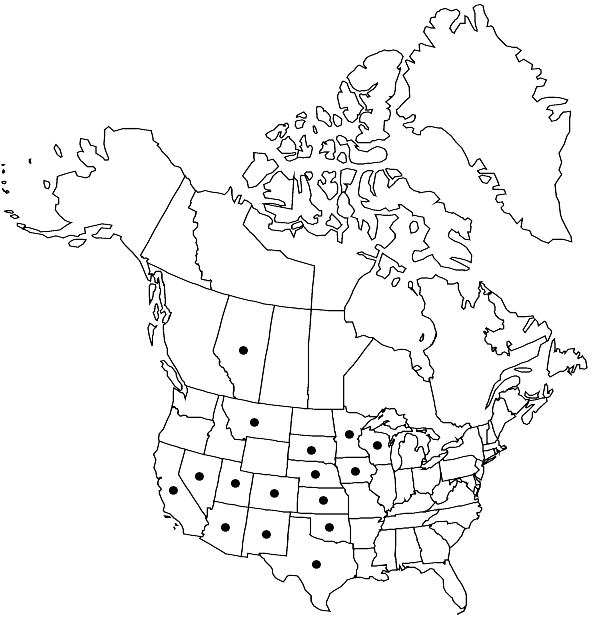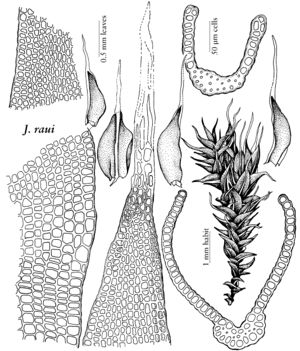Jaffueliobryum raui
Rev. Bryol., n. s. 1: 193. 1928,.
Plants in small dense cushions or turfs, yellow-green to dark olivaceous, hoary. Stems 5–20 mm, sparsely branched. Leaves crowded, ovate to obovate, imbricate to appressed-julaceous distally, somewhat spreading to squarrose-recurved proximally, 0.6–1.2 mm excluding awn, apex acute to acuminate, lamina 1-stratose to rarely 2-stratose in bands, awn length highly variable, 0.3–1.4 mm, hyaline; costa in transverse-section distinctly keeled; proximal cells rectangular, 15–40 × 10–20 µm, often appearing lax; mid leaf cells isodiametric to short-oval, (5–) 8–12 (–20) µm; distal cells somewhat longer than mid leaf cells. Sexual condition autoicous; perichaetial leaf lamina to 1.5 mm, awn 1–1.7 mm. Seta 0.4–0.6 mm. Capsule yellowbrown turning redbrown with age, ovoid to subglobose, 0.8–1 mm; operculum short-rostrate, 0.5–0.6 mm.
Phenology: Capsules mature spring–summer depending on elevation.
Habitat: Widespread and locally common on dry sandstone or limestone rock, open arid to semi-arid shrub, woodland communities, grasslands, rarely on compacted sandy soil
Elevation: moderate to high elevations (200-2100 m)
Distribution

Alta., Ariz., Calif., Colo., Iowa, Kans., Minn., Mont., Nebr., Nev., N.Mex., Okla., S.Dak., Tex., Utah, Wis.
Discussion
Jaffueliobryum raui is a common species in drier parts of the United States, especially on the Great Plains and the Colorado Plateau, extending to the Mohave Desert of California. This species appears to be disjunct to southern Alberta, but the distribution is likely continuous, as the band of calcareous bedrock on which it occurs runs along the Rocky Mountain Front Range from Alberta well into Montana. Sites in the Driftless Area of Iowa, Minnesota, and Wisconsin may be truly disjunct. However, more collecting is likely to fill in gaps in its range in the northern Great Plains and clarify its status in the Great Basin.
Jaffueliobryum wrightii is very closely related, and the two species have been treated as one for much of their taxonomic history. In addition to traits used in the key, there are a variety of other partially overlapping characters that separate the two, including leaf width at widest point, lamina length, costal width, lamina cell length and angle between the margin at the leaf widest point and the tip of the awn, and capsule and operculum length.
Selected References
None.
Lower Taxa
"variable" is not a number.
